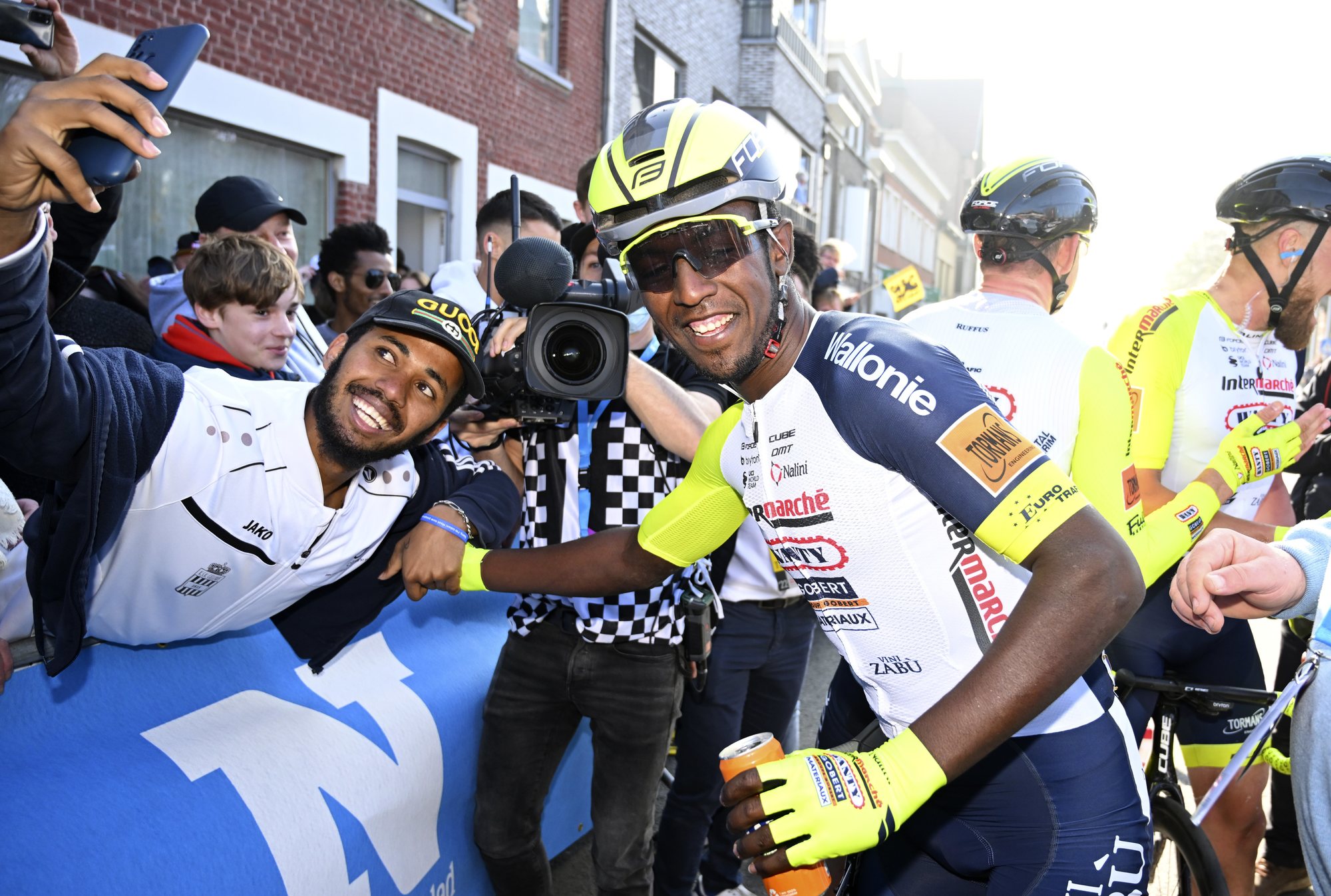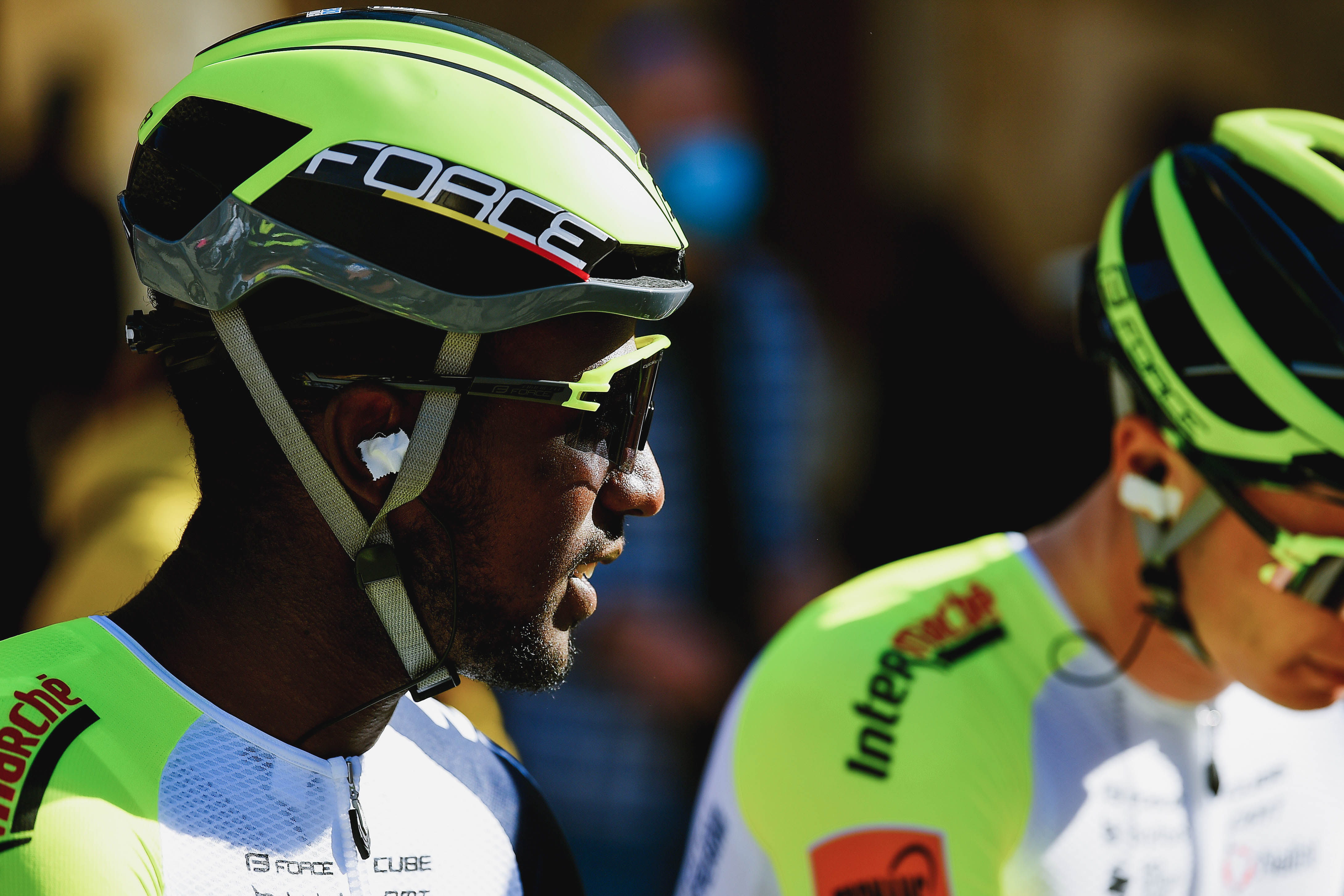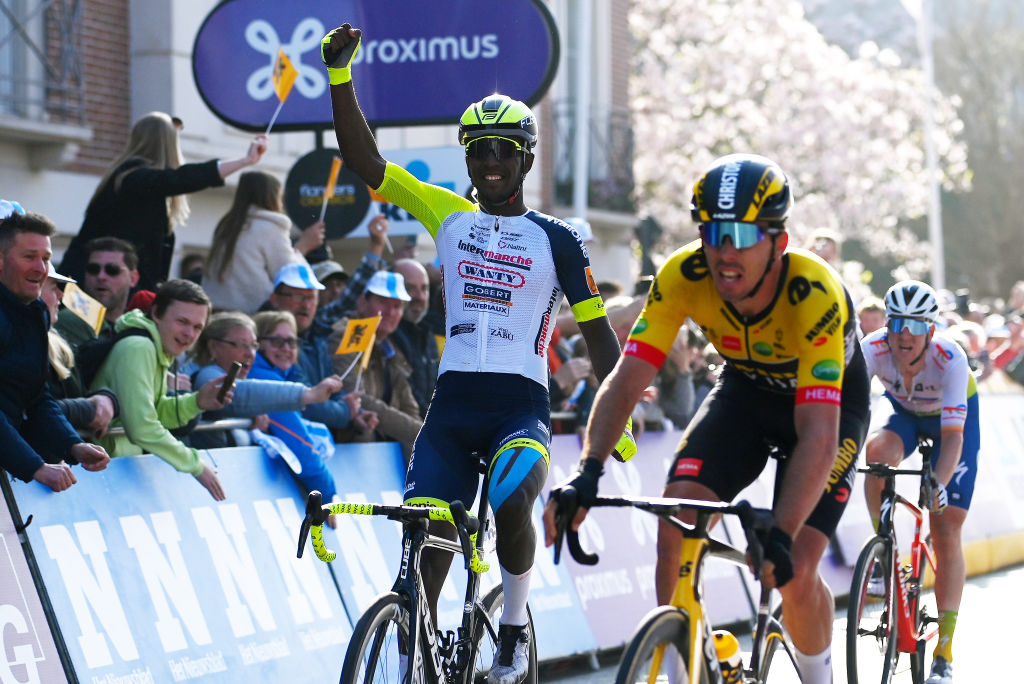Winner with a human touch: Girmay finds a home from home at Intermarché
The post-E3 Harelbeke conversation that set up the Eritrean’s Gent-Wevelgem victory

On crossing the finish line in fifth place at the E3 Saxo Bank Classic, an exhausted Biniam Girmay pedaled softly towards the Intermarché-Wanty-Gobert team bus. When he got there and climbed up the steps, performance director Aike Visbeek had a suggestion: how about doing all that again?
Girmay’s provisional schedule had him slated to compete in France at La Roue Tourangelle, but the preternatural assurance of his debut on the cobbles prompted Visbeek to enact Plan B, having already alerted the Eritrean’s coach. By the time the 21-year-old had showered and descended the steps once more to speak with a waiting group of reporters, he was able to tell them that, yes, he would be lining out at Gent-Wevelgem two days later.
The rest is a landmark in cycling history.
“It was on my mind already, because I saw Biniam was still recovering really well from the races,” Visbeek explained in Wevelgem on Sunday evening.
“I didn’t want to bother him before Harelbeke, because that’s a very complicated race with a lot of hills. But I said internally, ‘Listen, if Harelbeke goes really well, I want to change the plan towards Gent-Wevelgem.’ His trainer was on board, we had a good call about that.’ And after the race I talked directly to him, before he could talk to the media. We had to ask first.”
Girmay, one imagines, didn’t need much persuading. His trek over the Paterberg, Oude Kwaremont et al on Friday had been his first meeting of any description with the Flemish Ardennes. He hadn’t so much as recce’d the route beforehand but he rode with the mien of a man developing an immediate fondness for racing amid the cobbles and hills. When the Jumbo-Visma duo of Wout van Aert and Christophe Laporte cruised away towards a remarkable two-up win on the Paterberg, Girmay came closer than anyone else to following.
At Gent-Wevelgem, he navigated the scramble for position on the Kemmelberg and Plugstreets partly through his racing nous and partly by leaning on the experience of teammates like Alexander Kristoff and Adrien Petit.
Get The Leadout Newsletter
The latest race content, interviews, features, reviews and expert buying guides, direct to your inbox!
“At E3 he didn't even know whether there were cobbles on the Oude Kwaremont or not,” Petit revealed.
Throughout Gent-Wevelgem, Girmay raced not so much with the fearlessness of youth as with the confidence of a man bearing the most precious attribute of all: talent.
“When you know all the parcours, maybe it gets a bit overwhelming, and that’s also why we didn’t want to add stress to his schedule with more recons,” Visbeek said.
“We have Adrien Petit, we have Aimé De Gendt, we have Alexander Kristoff. He trusts those guys, and that’s why he’s in a perfect situation. He has the guys that guide him. He was in the shadow of Alexander Kristoff, which was perfect. They learn from each other and give motivation to each other.”
In the finishing straight in Wevelgem, Girmay’s race-craft saw him sit at the back of the four-man break that had forged ahead with 24km remaining. Over his radio earpiece, he had been warned that Laporte, second in the Harelbeke, would be the dangerman again here. Girmay understood that it was the kind of sprint where he needed to get his retaliation in first, and so he kicked with 250m to go.
“It was a headwind sprint, and I said if he was not on the wheel of Laporte, then he had to go himself because Laporte can go from distance,” Visbeek said admiringly. “He was in fourth wheel and that’s why he went the way he did.”
Not a luxury team

Girmay’s victory at Gent-Wevelgem had a special resonance for his team, given that Wanty rider Antoine Demoitié tragically lost his life in a crash at this race in 2016. The Eritrean, who arrived at Intermarché-Wanty-Gobert in the middle of last season after Delko ran into financial difficulties, is under contract with the Belgian team until the end of 2024.
A rider whose resumé featured a rare victory against a rampant Remco Evenepoel in the junior ranks should not have been short of suitors, but Intermarché-Wanty-Gobert, one of the smallest squads in the WorldTour, was perhaps the ideal landing site.
“It’s not a luxury team. It’s a group with a real family feel to it,” said Visbeek, who played a key role in Tom Dumoulin’s development during his time at Sunweb, another squad that grew organically over the years from modest beginnings.
“Signing Alexander Kristoff this year gave us a bit more respect in the bunch, and when we got a good start with Bini and some of the other guys, we claimed our spot and we don’t want to give it away. We are a group of nice people who work really hard, and Biniam fits really well with that.”
Adrien Petit’s back catalogue includes leading out Arnaud Démare for victory in the under-23 World Championships in Copenhagen, but he gave the impression that his stint in Girmay’s service on Sunday might linger just as long in the memory.
“It warms my heart just to think that I helped to bring him up to the front of the bunch before the last time up the Kemmelberg,” he said.
“People like him, and that’s not strange because he’s a really nice guy,” Visbeek noted.
“He’s a winner, but with a human touch and with a smile. When he wins a race, he’s very thankful. He goes to every member of the staff to thank them, and you don’t see that so often.”

Girmay has now performed that round of handshakes and embraces three times at Intermarché-Wanty-Gobert, following his wins at the Classic Grand Besançon Doubs last year and the Trofeo Alcúdia in January. There will surely be many more in the years ahead, but not at the Tour of Flanders on Sunday.
Since the depths of winter, it had been agreed that Girmay, whose European base is in San Marino, would return to Eritrea in April to spend time with his family in Asmara. That plan will be respected.
The sponsors will have enjoyed the assembly of television crews waiting for Girmay outside the Zuidwege hotel in Zedelgem on Monday morning, but the team will not insist that he prolongs his stay in Belgium until the Ronde.
“He has to go to his family, whom he hasn't seen since January 3. He needs that,” insisted directeur sportif Hilaire Van der Schueren, a thought echoed by Visbeek.
“I mean, we also have to see the human aspect of it, and he’s been away from his family a long time,” Visbeek said.
“The only person who can decide is Biniam himself, along with his family. For us, there is no pressure. We are very happy and proud of him. Our cycling team is a family. We’re known for that. We don’t have a big budget, but we invest in the right things and have good contact with our riders.”
Working with Girmay, Visbeek added, has been straightforward. Young, talented athletes are not always the most coachable, but Girmay, who took his first steps in European racing as a junior at the UCI World Cycling Centre in Aigle, knows the value of dialogue.
“He’s a guy that’s down to earth, very friendly and open,” Visbeek said.
“When he trusts you, he really trusts you, and that also helps to make steps really fast, because we can discuss things with him. He also has a lot of common sense. He’s not bothered by the outside world too much. And improvement is still possible: he can sprint more aerodynamically, and on nutrition he can still improve too.”
During his time in Eritrea, Girmay will train in preparation for his Grand Tour debut at the Giro d’Italia, and just before the corsa rosa, he will line up with ambition at Eschborn-Frankfurt on May 1. Even if the Ronde is not on the agenda this season, there are plenty of opportunities to shine in the weeks and months ahead.
“I think the break will do him good because his first Grand Tour is coming and that’s a new situation in his career. It’s going to be a learning experience,” said Visbeek.
“Thanks to Alexander Kristoff, he didn’t have all the eyes on him from the beginning of the season, but now he will.”
In Leuven last September and now in Wevelgem, Girmay has reached notable milestones for Eritrean and African cycling and the expectation is that more will follow.
“He’s aware of the fact that he’s doing historical things and he wants to do that for his continent and his nation,” said Visbeek, though he added that the weight of history is lightly worn: “He wants to win bike races.”

Barry Ryan was Head of Features at Cyclingnews. He has covered professional cycling since 2010, reporting from the Tour de France, Giro d’Italia and events from Argentina to Japan. His writing has appeared in The Independent, Procycling and Cycling Plus. He is the author of The Ascent: Sean Kelly, Stephen Roche and the Rise of Irish Cycling’s Golden Generation, published by Gill Books.